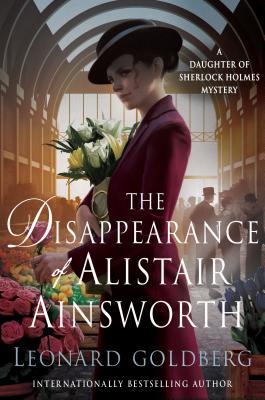 The Disappearance of Alistair Ainsworth (The Daughter of Sherlock Holmes Mysteries #3) by Leonard Goldberg
The Disappearance of Alistair Ainsworth (The Daughter of Sherlock Holmes Mysteries #3) by Leonard Goldberg Format: eARC
Source: supplied by publisher via Edelweiss, supplied by publisher via NetGalley
Formats available: hardcover, large print, paperback, ebook, audiobook
Genres: historical mystery, mystery
Series: Daughter of Sherlock Holmes #3
Pages: 320
Published by Minotaur Books on June 11, 2019
Purchasing Info: Author's Website, Publisher's Website, Amazon, Barnes & Noble, Kobo, Bookshop.org
Goodreads
In the third book of this critically-acclaimed series, Sherlock Holmes' daughter faces a new unsolvable mystery with spies and a threat to the crown. Joanna and the Watsons receive an unexpected visitor to 221b Baker Street during a nocturnal storm. A rain-drenched Dr. Alexander Verner arrives with a most harrowing tale.
Verner has just returned from an unsettling trip to see a patient who he believes is being held against his will. Joanna quickly realizes that Verner's patient is a high-ranking Englishman who the Germans have taken captive to pry vital information about England’s military strategies for the Great War. The man is revealed to be Alistair Ainsworth, a cryptographer involved in the highest level of national security.
The police are frantic to find Ainsworth before the Germans can use him to decode all of England’s undeciphered messages. Ainsworth must be found at all costs and Joanna and the Watsons might be the only ones who can connect the clues to find him.
USA Today bestselling author Leonard Goldberg returns with another puzzling case for the daughter of Sherlock Holmes to unravel in this exciting mystery sure to be enjoyed by fans of Sherlock Holmes.
My Review:
 After yesterday’s book, I was looking, partly for comfort but mostly for something where I knew what I was letting myself in for before I started. (Also looking for NOT a 700 page doorstop!) Then I saw that the fourth book in this series, The Art of Deception, came out recently – but I hadn’t read the third one yet.
After yesterday’s book, I was looking, partly for comfort but mostly for something where I knew what I was letting myself in for before I started. (Also looking for NOT a 700 page doorstop!) Then I saw that the fourth book in this series, The Art of Deception, came out recently – but I hadn’t read the third one yet.
And I’m always a sucker for a Sherlock Holmes pastiche, so I hunted this up in the virtually towering TBR pile, read the first chapter and BOOM the game was afoot!
Not that Joanna Blalock Watson ever utters her father’s favorite catchphrase during the course of this entry in the series. Although she certainly seems to have more than her fair share of her father’s attributes, talents and personal foibles.
As well as his partner and amanuensis, Dr. John H. Watson, Sr. But her father’s old partner isn’t hers. Rather, that role has fallen to his son, Dr. John H. Watson, Jr. The younger Watson fills multiple roles in Joanna’s life, as pathologist, partner in detection, chronicler and biographer, as well as husband and stepfather to her young son, who even as a teen is already a chip off the family block.
As, to some extent, is this case, reminiscent as it is of The Adventure of the Greek Interpreter and His Last Bow, encompassing as it does some of the plot elements of Greek Interpreter with the time period and circumstances of His Last Bow, which provides some information about Holmes’ service to the Crown during the Great War. In this series of his daughter’s adventures, Holmes has been deceased for some years, so those services to the Crown are provided by his daughter Joanna instead, with the able assistance of both of the Drs. Watson.
While the story begins with the kind of convoluted opening that Holmes’ cases were famous for, it quickly morphs into something that is both more so – and less at the same time. Initially, this is a case of a doctor treating a mysterious patient at the end of an equally mysterious journey, only to learn that his patient is not so much a patient as he is a captive trying to get out the message that he is in a great deal of trouble.
And that’s where the Crown steps into this narrative, as the captive is missing from his job as one of Britain’s top cryptanalysts. It is late in 1915, there is a war going on, and Alistair Ainsworth is a key figure in both deciphering coded enemy dispatches and encoding those of the British. German agents have kidnapped the man with the obvious intent of breaking him, getting him to work on their behalf both to tighten up their own codes and to break any codes that the British have used in the past, or will in the future.
The German agents are professionals; careful, cunning and seemingly always one step ahead of Joanna, the Watsons and the police. But there are three factors that they never seem to have accounted for in all of their careful planning. Their captive is a master chess player, always two or three steps ahead, attacking on multiple fronts and willing to play as long a game as necessary. His colleagues are, while not quite up to his level, geniuses at code breaking in their own rights and able to work from the tiniest of clues provided by their colleague. And last but not least, they clearly never reckoned on needing to keep several steps ahead of the daughter of Sherlock Holmes.
Escape Rating B+: I was looking for a book where I knew pretty much what I was letting myself in for and that is exactly what I got. And yet it still managed to make me think. I’ll get to that in a minute.
This series, at least so far, is part of a group of series that take the Holmes canon that we know and twist it in, not exactly a feminist direction – although that can be part of it – but in a direction that provides a thinking woman’s perspective on what was originally an all-male preserve.
So there’s a kinship between Mary Russell (The Beekeeper’s Apprentice), Charlotte Holmes (A Study in Scarlet Women) and Joanna Blalock in that all of them use the canon as the way of telling another story entirely, a story that still works while eliminating the air of white male exclusivity and yes, privilege, that surrounds the original stories.
(The marvelous Mycroft and Sherlock series by Kareem Abdul-Jabbar and Anna Waterhouse does the same kind of thing but in a different direction, by inserting into the narrative a young Mycroft’s friend and frequent detecting partner, the older, somewhat calmer and generally more dispassionate Cyrus Douglas, a black man from Trinidad.)
All of which means that if you enjoy Holmes well enough to like one of these series, there’s a fair chance you’ll enjoy some of the others. Without necessarily having to start at the beginning of any as the Holmes canon has permeated pop culture to the extent that we all know at least a tiny bit, even if only from The Great Mouse Detective.
But that change in perspective, as well as the change in time period both for the story and for the author writing it, makes us see some things in a new way. Particularly when reminded of the fact that Conan Doyle wrote the originals as contemporary stories. He was living the times he was writing about. The pastiches that have followed have become historical because the Victorian era that Holmes and Doyle lived in has retreated from us further every year.
So, as much as I enjoyed this foray into a variation of Holmes that tries its best to be both different and the same at the same time, I found myself thinking about some things that felt meta rather than about the book in my hand.
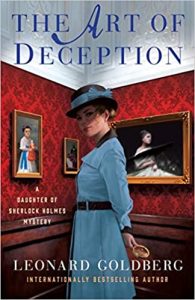 What struck me was the attitude towards the German agents who had kidnapped Ainsworth. There is a tendency in times of war to dehumanize the enemy in order to justify the war and all the things that happen within it. But the perspective of Germans as a race rather than a nationality, and the way that national characteristics had become easy stereotypes felt both logical for their time and place AND sat uneasily at the same time. It reminded me that in the original stories, Holmes and Watson are creatures of their time, with all of the racism and sexism and plenty of other terrible -isms that were part of that era. I was painfully aware that I wanted them to be better because they are characters that I love, but that they were not, no matter how much more recent adaptations have tried to ameliorate or eliminate those tendencies.
What struck me was the attitude towards the German agents who had kidnapped Ainsworth. There is a tendency in times of war to dehumanize the enemy in order to justify the war and all the things that happen within it. But the perspective of Germans as a race rather than a nationality, and the way that national characteristics had become easy stereotypes felt both logical for their time and place AND sat uneasily at the same time. It reminded me that in the original stories, Holmes and Watson are creatures of their time, with all of the racism and sexism and plenty of other terrible -isms that were part of that era. I was painfully aware that I wanted them to be better because they are characters that I love, but that they were not, no matter how much more recent adaptations have tried to ameliorate or eliminate those tendencies.
On the whole, I enjoyed reading this one, except for the above niggles. I found it to be – while not as utterly absorbing as the first book in the series, The Daughter of Sherlock Holmes, considerably better and more original than the second, A Study in Treason. I’ll certain be back for The Art of Deception when I’m next in the mood for a taste of Sherlock.




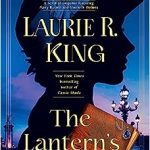
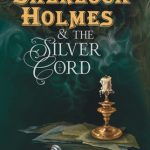




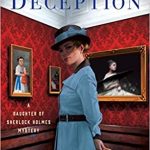
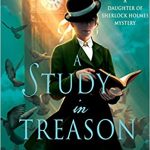




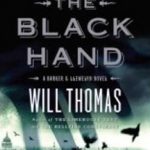


Great review. Thank’s for sharing!